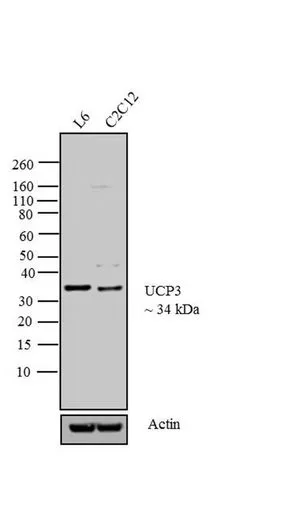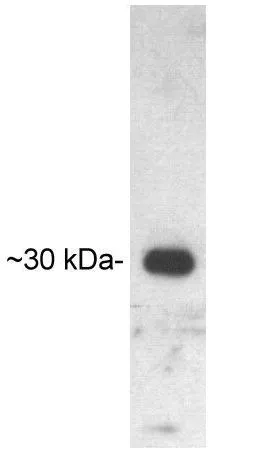
WB analysis of membrane enriched extracts (30 microg lysate) of L6 (Lane 1) and C2C12 (Lane 2) using GTX23477 UCP3 antibody. Dilution : 1 microg/ml
UCP3 antibody
GTX23477
ApplicationsWestern Blot
Product group Antibodies
ReactivityCanine, Human, Mouse, Rat
TargetUcp3
Overview
- SupplierGeneTex
- Product NameUCP3 antibody
- Delivery Days Customer9
- Application Supplier NoteWB: 0.5-2 microg/ml. *Optimal dilutions/concentrations should be determined by the researcher.Not tested in other applications.
- ApplicationsWestern Blot
- CertificationResearch Use Only
- ClonalityPolyclonal
- Concentration1 mg/ml
- ConjugateUnconjugated
- Gene ID22229
- Target nameUcp3
- Target descriptionuncoupling protein 3 (mitochondrial, proton carrier)
- Target synonymsAI645527; mitochondrial uncoupling protein 3; Slc2; Slc25a9; solute carrier family 25 member 9; UCP-; UCP-3
- HostRabbit
- IsotypeIgG
- Protein IDP56501
- Protein NameMitochondrial uncoupling protein 3
- Scientific DescriptionThe uncoupling proteins (UCPs) are found in the inner mitochondrial membranes and belong to a family of mitochondrial anion transport proteins that include the phosphate and oxologutarate carriers and the ADP/ATP translocator. Three UCP subtypes have been identified and cloned. UCP-1 is abundantly expressed in brown adipose tissue of mammals. UCP-1 allows proton re-entry into the mitochondrial matrix without involving the F0-F1 ATPase which produces heat instead of ATP. It is thought that UCP-2 and 3 also dissipate the mitochondrial proton gradient produced by the respiratory chain in cells and tissues within which they are expressed. Studies have shown UCP-2 to be expressed by a variety of tissues. UCP-3 is expressed predominantly in brown adipose tissue, skeletal muscle, at lower levels in heart and smooth muscle, and is absent in liver and kidney.
- ReactivityCanine, Human, Mouse, Rat
- Storage Instruction-20°C or -80°C,2°C to 8°C
- UNSPSC12352203

